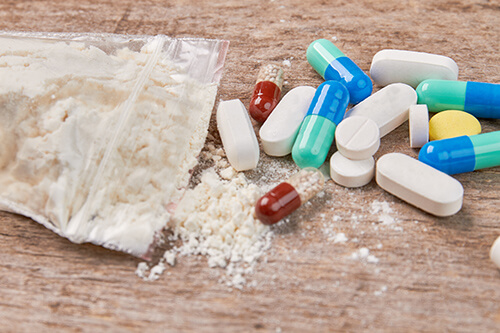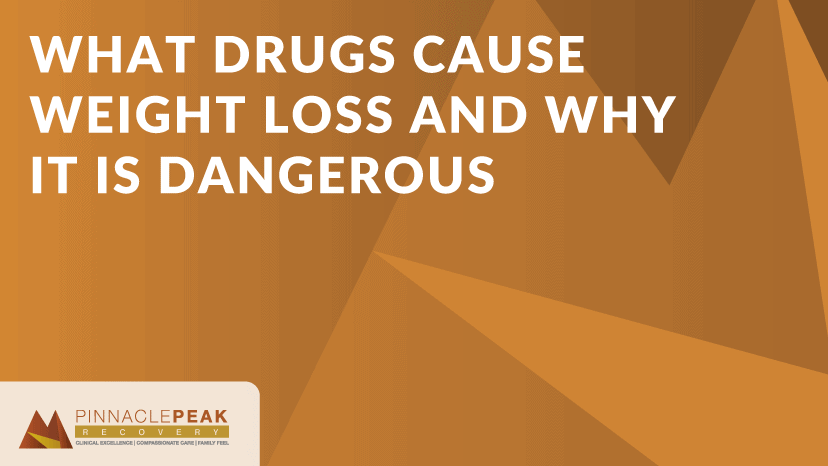When it comes to drug addiction and weight loss, there are two types of users: the ones seeking weight loss and the ones that don’t. Regardless of the presence of intentionality on the weight disturbance, losing weight because of drug use can be very dangerous.
Many individuals still support the connection between substance use and weight loss solely on the appetite inhibitor potential of most drugs. Researchers actively investigate this mutual relationship and the exact effects of various drugs on our bodies.

The subject is controversial and disagreements between findings are not uncommon. Studies largely depend on the subjects which present a myriad of variables (i.e. age, gender, ethnicity) that can influence conclusions, especially when it comes to nutrition.
In reality, there are many contributing factors beyond a plain lack of appetite. Weight loss due to drugs relates to changes in eating habits, metabolism processes, and overall lifestyle in people struggling with drug addiction. All of these three variables correlate so when changes occur in one, it affects the others.
When it comes to lifestyle, for example, drug consumption disturbs our sleep-wake cycle. People struggling with addiction have inconsistent sleeping patterns and remain awake for more extended periods. In addition, using drugs lowers the quality of your sleep. All of these changes in your sleep reverberate on your overall health, including weight control. Insufficient sleep, for example, has the potential to affect the release of hormones that tells us when we are hungry or not.
Another way that lack of sleep can cause weight loss is the fact that someone using stimulants will be awake, hyperactive, and have more opportunities and consequently burn more calories. This includes street drugs such as cocaine, crack, meth, and ecstasy, as well as pharmaceuticals such as Adderall, Ritalin, and Desoxyn. Among people who seek drugs to lose weight, stimulant drugs are a popular choice.
That doesn’t mean that depressant drugs such as heroin and alcohol cannot affect body weight.
Both classes of drugs—depressants and stimulants—have the potential to alter one’s eating habits. First, when you are high, the least of your worries is eating. Second, not only will you eat less, but using drugs can lead to poor food choices. One can become more careless about nutrition and focus time, money, and energy on seeking your next dose instead of the next meal. This can result in choosing cheaper and more convenient meals which lack nutritional value.
When Weight Loss Caused By Drugs Becomes Dangerous
The lifestyle of people struggling with substance use has more risks compared to people that don’t. Short-term use creates a lot of harm to one’s health, but long-term drug use can have far-reaching consequences such as cardiovascular disease, stroke, HIV/AIDS, Hepatitis B and C, and lung disease to name a few. When added with weight loss and poor nutrition, one’s health becomes even more fragile and the immune system becomes extremely compromised. The results can be catastrophic. In this scenario, something as simple as a cold or small skin infection can turn into more serious issues in which the body will have trouble bouncing from it without a boosted immune system.
Are You Seeking Help For A Loved One
With Substance Use Disorder?
Give Us A Call Today
Does Drug Use Cause Changes In Your Metabolism?
Although there are many controversies surrounding nutrition, a few studies have uncovered ways that drugs can alter our metabolism.
Metabolism is the process of breaking down the food we eat into the energy the body needs to function properly. Food is made of macronutrients such as carbohydrates, proteins, and lipids and our bodies process each differently. When ingested, each macronutrient will create distinct metabolic reactions to be converted into energy immediately or stored in the body as fat. Macronutrients also create a hormonal release that signals the brain that we are full. When we eat a meal rich in carbohydrates, we release insulin into our bodies. With a meal rich in lipids, the body releases leptin. A protein-filled meal releases glucagon. These three hormones act as hunger inhibitors. Studies have shown that using drugs can disturb such processes.
For example, a study published by Appetite observed that chronic cocaine use created an imbalance between fat intake and fat storage. Researchers observed that cocaine users were unable to retain fat in their bodies which created a compensatory eating habit with a substantial increase of carbohydrates and fat in their diets.
Nutrition and Metabolism: Journal found a link between dopamine activity and weight management. Their findings validate dopamine’s crucial role in eating behavior. The study connected the lack of dopamine to obesity and concluded that releasing more dopamine would lead to weight loss. Using drugs such as cocaine, meth, and heroin creates a huge surge of dopamine released into the brain which can further explain the weight loss experienced by people struggling with these drugs.
Published in Neuropsychobiology Journal, an experiment done on people struggling with heroin addiction found that heroin keeps levels of insulin higher for extended periods, and proposed the influence of the drug on the neurotransmitter that regulates insulin. That can account for the lack of interest someone using heroin has for food.
As mentioned above, using drugs disrupts your sleep cycle which has a domino effect on your metabolism. That is because not sleeping enough dysregulates your circadian rhythms. Circadian rhythms work as your body’s internal clock sending messages and cues that control physical, mental, and behavioral changes throughout a 24-hour cycle. A study published by Cambridge University proved how our circadian rhythms cascade into other systems in the body including your metabolism and disturb glucose-insulin metabolism, leptin and ghrelin concentrations, appetite, and food reward. Even if using a substance is not directly correlated to metabolic disruption, drug-using habits, such as lack of sleep, may change how your body functions and, ultimately, lead to weight loss.
Seeking Treatment For A Loved One
With Drug Addiction?
Call Us Today
Drug Use Causes Loss Of Appetite
Appetite is a natural desire to eat and there are two ways in which drugs can alter it: they can change our metabolism by releasing or inhibiting hormones that communicate to our brain when we are hungry or full. And/or affect our eating habits which will create an imbalanced diet.
For example, side effects such as nausea and vomiting deter people that use heroin from eating as well as constipation. Alcohol, on the other hand, can fool your stomach into thinking it is full which inhibits the release of the hormone ghrelin which tells us we are hungry.
Weight Loss and Mental Health
The societal pressure to look a certain way creates numerous issues in people’s psyche which have devastating results on their mental and physical health. A report from Harvard University found that 28.8 million Americans will have an eating disorder in their lifetime which can start as young as 5 years old to over 80 years old. Women are generally among the population that suffers from this the most being twice as likely to develop an eating disorder as men.
A study released by Addictive Behaviors found that half of the women who used cocaine did so to lose weight; of this group, 72% had eating disorders. It also showed that female college students who use Adderall, a stimulant prescribed for ADHD, for weight loss also suffered from low self-esteem, and stress-related eating.
When someone looks into something as radical as using drugs to lose weight, it is a red flag that their mental health may be clouded by an eating disorder.
Getting Help with Drug Addiction Treatment
Weight loss is a dangerous side effect of drug addiction and a reminder of how fragile our bodies become while struggling with drugs. Seeking help sooner than later will prevent you, or your loved one, to become extremely malnourished with brittle health which will add another layer to your path to recovery.
Finding yourself, or a loved one, struggling with addiction that began mainly based on the need to lose weight means that there are co-occurring issues, such as eating disorders and low self-esteem, that need to be addressed for a successful recovery.
Pinnacle Peak Recovery offers treatments that include dual diagnosis therapy which addresses not only drug addiction, but also any underlying mental health issues. We offer a variety of treatments such as evidence-based therapy, family therapy, and experiential therapy, along with holistic treatments that will make your recovery path more solid and clear.
Call us at 866-377-4761 to assess your situtation and begin planning a treatment tailored for you by our team of professionals. Take your first step towards sobriety today.
Seeking Help for A Loved One with
Substance Use Disorder?
Call Us To Start Their Process To Recovery.
FAQs About What Drugs Cause Weight Loss
Does drug use cause people to lose weight?
Yes, drugs can change your metabolism, inhibit your appetite, and disrupt your sleep cycle and your eating habits. All of these variables account for weight loss.
What are the dangers of losing weight with drugs?
Using drugs puts you at great risk to develop an addiction problem. Also, besides losing weight, you’ll experience dangerous side effects that will harm your health. While some side effects are short-term, struggling with addiction for an extended time can cause permanent damage.
Does cocaine make you skinny?
One of the side effects of the continuous use of cocaine is weight loss. However, using cocaine to get skinnier is not a good plan. First, you can easily become addicted to cocaine, and a struggle with drug abuse is tougher than battling your weight. Second, once you stop using cocaine, you’ll most likely gain weight as you begin your sobriety journey and your body heals.


